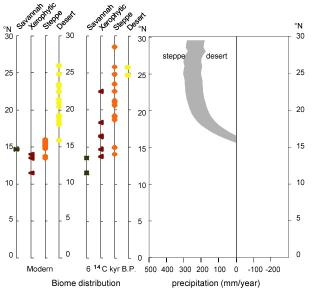PMIP 2 Diagnostic For Mid-Holocene Precipitation Over Northern Africa
Data description
Pollen evidence indicates that grassland and xerophytic
woodland/scrubland occurred in ares of northern Africa characterised
by desert today during the mid-Holocene (Jolly et al., 1998a,
1998b). Mid-Holocene pollen assemblages for sites south of 23° N
do not contain taxa with desert affinities (Dominique Jolly,
unpublished analyses), indicating that the region south of 23° N
was characterised by grassland not desert.
The increase in mean annual precipitation required to support
grassland at each latitude from 0 to 30° N compared to the modern
precipitation at that latitude, zonally averaged over the range
20° W to 30° E longitude, has been calculated using the
water-balance module from the BIOME3 equilibrium vegetation model
(Haxeltine and Prentice, 1996) (see Joussaume et al., 1999). The
latitudinal distribution of biomes (reconstructed at individual pollen
sites) in northern Africa today and during the mid-Holocene (6000
±500 yr B.P.) are shown on the graphic below. The grey-shaded
area on the graphic shows maximum and minimum estimates of the
increase in precipitation required to support grassland at each
latitude. To use this graphic as a model benchmark, simulated DeltaP
is required to lie above/within the grey band at all latitudes from
0-23° N.

(Click on the figure to get a bigger version)
Data download
If you wish to use these data as a diagnostic, please cite
Joussaume et al. (1999) as the first application, and the following
website http://www.bridge.bris.ac.uk/pmip2/synth/index.htm as the
source.
References
-
Jolly, D., Harrison, S. P., Damnati, B., and Bonnefille, R. (1998a).
Simulated climate and biomes of Africa during the Late Quaternary:
Comparison with pollen and lake status data. Quaternary Science
Reviews 17(6-7), 629-657.
-
Jolly, D., Prentice, I. C., Bonnefille, R., Ballouche, A., Bengo,
M., Brenac, P., Buchet, G., Burney, D., Cazet, J. P., Cheddadi, R.,
Edorh, T., Elenga, H., Elmoutaki, S., Guiot, J., Laarif, F., Lamb,
H., Lezine, A. M., Maley, J., Mbenza, M., Peyron, O., Reille, M.,
Reynaud-Farrera, I., Riollet, G., Ritchie, J. C., Roche, E., Scott,
L., Ssemmanda, I., Straka, H., Umer, M., Van Campo, E., Vilimumbalo,
S., Vincens, A., and Waller, M. (1998b). Biome reconstruction from
pollen and plant macrofossil data for Africa and the Arabian
peninsula at 0 and 6000 years. Journal of Biogeography 25(6),
1007-1027.
-
Haxeltine, A., and Prentice, I. C. (1996). BIOME3: an equilibrium
terrestrial biosphere model based on ecophysiological constraints,
resource availability, and competition among plant functional
types. Global Biogeochemical Cycles 10(4), 693-709.
-
Joussaume, S., Taylor, K. E., Braconnot, P., Mitchell, J. F. B.,
Kutzbach, J. E., Harrison, S. P., Prentice, I. C., Broccoli, A. J.,
Abe-Ouchi, A., Bartlein, P. J., Bonfils, C., Dong, B., Guiot, J.,
Herterich, K., Hewitt, C. D., Jolly, D., Kim, J. W., Kislov, A.,
Kitoh, A., Loutre, M. F., Masson, V., McAvaney, B., McFarlane, N.,
de Noblet, N., Peltier, W. R., Peterschmitt, J. Y., Pollard, D.,
Rind, D., Royer, J. F., Schlesinger, M. E., Syktus, J., Thompson,
S., Valdes, P., Vettoretti, G., Webb, R. S., and Wyputta, U. (1999).
Monsoon changes for 6000 years ago: Results of 18 simulations from
the Paleoclimate Modeling Intercomparison Project
(PMIP). Geophysical Research Letters 26(7), 859-862.

